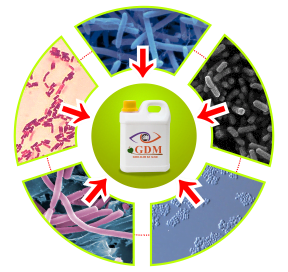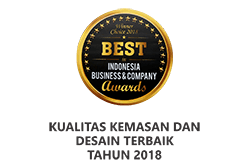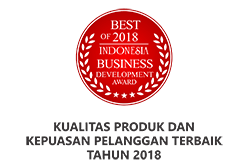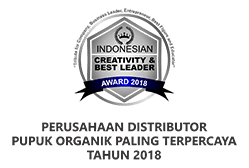Boost the quality and productivity of your yields
GDM Bio Organic Probiotic is a bio organic Probiotic which is produced from 100% organic and environmentally friendly with pure ingredients.
Bio organic Probiotic is very suitable for use in the field of farming and fishery.
![suplemen [1]](https://gdmorganic.com/wp-content/uploads/2019/01/suplemen-1.png)
Certificate & Awards
Ingredients of GDM Bio Organic Probiotic:
All ingredients included for the manufacture of GDM are “fresh” ingredients in which the ingredients are obtained every day and processed immediately so that no decay process occurs which allows the entry of disease sources. By using the selective organic ingredients, GDM is able to provide better results and guaranteed.
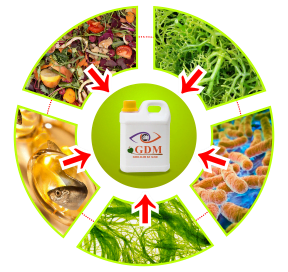
Organic waste in the manufacture of GDM products consists of:
- Animal Organic Waste
- Agricultural Organic Waste
- Organic Fisheries Waste
Organic waste is proven to be able to improve the physical and chemical properties of the soil, help improve soil micro-organisms, have a complete macro and micronutrient content, and be environmentally friendly, absorb and store water longer
Research shows that nutrient-rich seaweed. Seaweed contains minerals such as iron (Fe), iodine (I), aluminum (Al), manganese (Mn), calcium (Ca), nitrogen (N), phosphorus (P), sulfur (S), chlorine (Cl), silicon (Si), rubidium (Rb), strontium (Sr), barium (Ba), titanium (Ti), cobalt (Co), boron (B), copper (Cu), and potassium (K). Seaweed is also rich in protein, flour, sugar, and vitamins A, C, and D.
The high nutrient of seaweed is very beneficial for plants and soil
The content of animal oils is proven as:
- Anti-Fungus
- Anti-bacterial
- Anti Virus
As well as containing high essential minerals, essential minerals are proven to be very good for plant growth.
Algae is a natural resource that has a high level of diversity. The term algae come from the Latin “algae” which means sea algae.
Here are the benefits of Algae:
- As a Bioremediation Agent / Adsorbent for heavy metals.
- Contains a high CO element.
As a natural antibiotic.
Bacteria are an important element in GDM. Because of its existence can support plant growth and improve the availability of nutrients in the soil. Each bacterium has a different function, but all of them work together and work together in balance.
Here is a list of Bacteria contained in GDM organic probiotic:
- Bacillus Brevis
- Bacillus Pumillus
- Bacillus mycoides
- Pseudomonas Alcaligenes
- Pseudomonas Mallei
- Klebsiella Oxytaca
- Micrococcus Roseus
GDM Bio Organic Probiotic Product
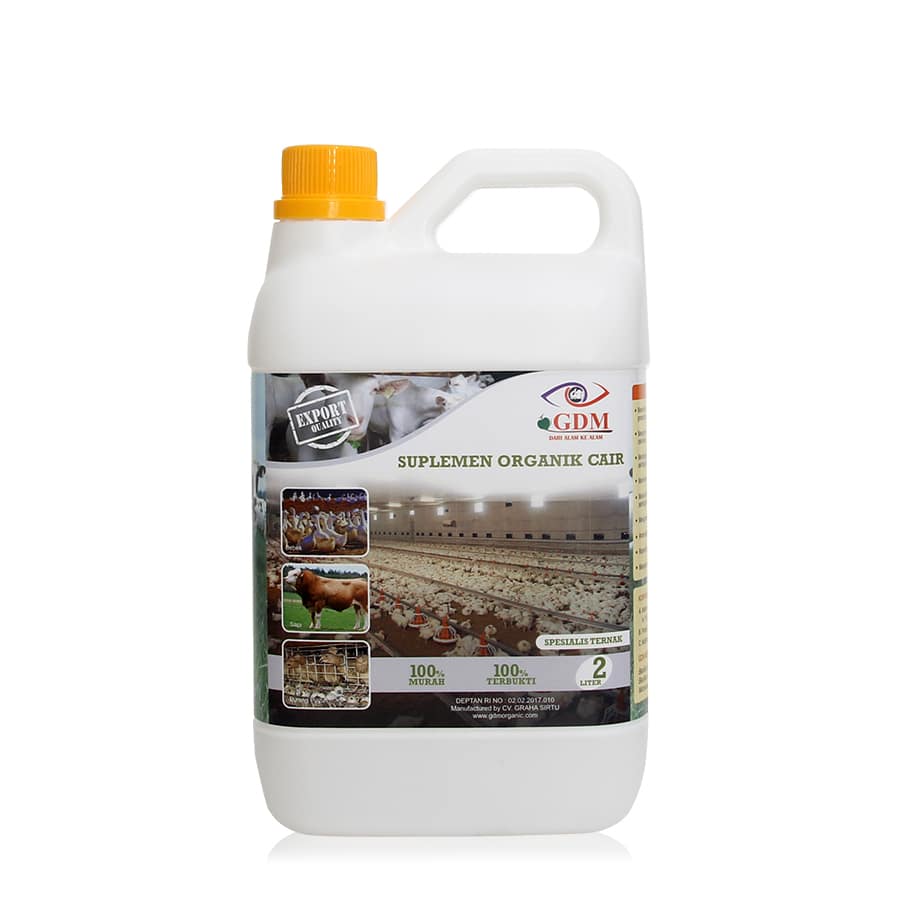
GDM Bio Organic Probiotic
Livestock Specialist:
It is a liquid organic supplement that contains the mineral elements needed by livestock and contains Apathogenic bacteria that are very beneficial for the growth of various types of livestock.
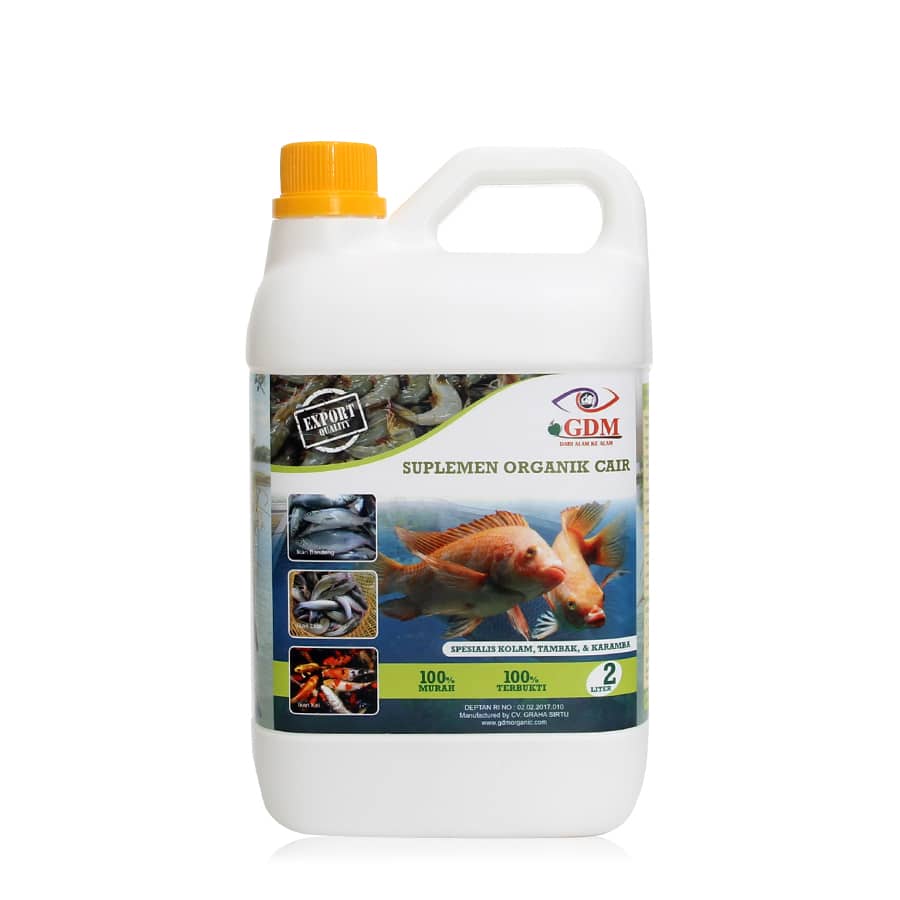
GDM Bio Organic Probiotic
Fishery Specialist:
Is a liquid organic supplement containing mineral elements needed fish and shrimp and Apathogenic bacteria which is very beneficial for the growth of various types of fish.
List of Bacteria contained in GDM Bio Organic Probiotic:
Bacteria are an important element in GDM products. Due to its existence can support the growth of various types of livestock through mineral elements contained. Each bacterium has its own distinct function, but the whole works together and synergizes in balance.
Here are the benefits of Bacillus brevis bacteria:
- Producing tyrocidine antibiotics, to increase livestock immunity from disease.
- Decompose phosphate in water so that it is rich in organic phosphate.
- Produces terotrisin enzymes as an antibody.
- Producing surfactin antibiotics to inhibit the growth of fungi in fish/shrimp.
Here are the benefits of Bacillus pumillus bacteria:
- Increase the digestibility of feed.
- Creating a microbial balance in the body.
- Increase milk and meat production.
- Inhibiting the growth of fungal and bacterial spore pathogens.
- Increase the appetite of fish and shrimp, thus speeding up harvest time.
Here are the benefits of Bacillus mycoides bacteria:
- Prevent and reduce death due to snoring & blue combs/wattles in broilers.
- Reducing ammonia gas in impurities.
- Reducing ammonia levels in the water.
- Increasing plankton diversity.
- Increase levels of crude protein.
- Reduce levels of crude fiber.
- Improving the quality of nutrient content in fish pellets.
Following are the benefits of Pseudomonas alcaligenes bacteria:
- Produces enzymes that are used to produce amino acids.
- Produces Polysaccharides which are used to inhibit certain diseases.
- Reducing levels of fat compounds in the blood.
- Decomposes organic matter such as feces/dirt, leftover food, shrimp & fish skins, algae, and other microbes.
- Decomposing pollutant waste in pond water/ponds.
Following are the benefits of Micrococcus roseus bacteria:
- Decomposes ammonia gas in feces.
- Decomposes hazardous materials such as industrial waste or biodegradation agents.
- Producing natural pigments so that the color of ornamental fish (koi and Arwana) will be brighter.
